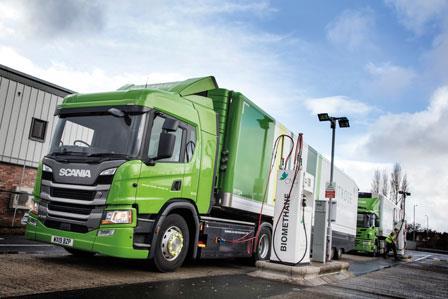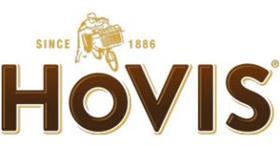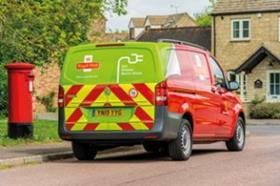
JLP began trials of two Waitrose-branded, biomethane-fuelled Scania 4x2 tractor units in 2016. The successful pilot scheme was followed by the introduction of a further 83 biomethane-fuelled vehicles between 2017 and 2019.
This rolling replacement programme is now being accelerated with 143 biomethane trucks scheduled to enter service in 2020. By 2028, all 600 JLP heavy trucks will operate on biomethane.
Working with gas suppliers to establish a network of biomethane refuelling hubs is also a key focus, with all sites providing open access to other operators.
JLP has also taken steps to reduce carbon dioxide emissions by using telematics and aerodynamically optimised trailers to lower fuel consumption.
On its home delivery fleet, the operator is trialling electric vehicle manufacturer Arrival's Generation 2 concept, with more vehicles in the pipeline.
On 13 of its refrigerated trailers, the operator is piloting an additional alternator on its biomethane artics to provide electrical power for the units.
JLP aims to begin the transition to electrically-powered heavy trucks in 2035, with full electrification completed by 2045, at which point a zero-carbon operation will be achieved.
The judges said JLP had shown “truly exceptional commitment to road freight decarbonisation and innovation”.
Hovis

Since 2015, Hovis has been focusing on four elements in its carbon-reduction strategy: reducing operating miles; improving mpg; reducing or removing the need for fossil fuels; and improving driving styles.
Since the initiative began, the bakery has removed around two million road miles through better route utilisation, adoption of the latest Microlise technology, and retiming customer deliveries.
It has also boosted mpg around 12% in the same period, introducing lighter vehicles and more aerodynamic trailers into its core fleet.
Driving style has been addressed through telematics training and monitoring, alongside a new CPC module being introduced.
One of its largest carbon-reduction gains has been through the adoption of new technology and fuels.
In November 2018, Hovis became one of the first UK operators to receive two new all-electric FUSO eCanters to trial. In their first 15 months of use, the zero-emission 7.5-tonners saved around 16.8 tonnes of CO2 compared with their diesel equivalents.
Hovis also made the decision to trial HVO (Green D) – a drop-in fuel supplied by Green Bio Fuels in a 12-month trial to include both Euro-5 and Euro-6 vehicles. This saw a CO2 reduction of 5,713 cubic tonnes.
Hovis will now roll out Green D across all its fleet vehicles, with predicted savings by the end of 2021 of 19,364 cubic tonnes of CO2.
The judges said: “Very good example of what companies can do right now, with their existing vehicles, to get within touching distance of net zero.”

With a 49,000-strong fleet and a universal obligation to deliver to
30 million UK addresses, six days a week, Royal Mail recognises the importance of reducing commercial vehicle emissions, as they generate 59% of the organisation’s carbon footprint.
Through a series of initiatives, the company has already beaten its target for a 20% reduction in CO2 by 2021 compared with a 2004 baseline, achieving 29% to date.
Fleet procurement ensures that the cleanest ICE models only join the fleet, alongside additional electric vans where possible.
Effective route optimisation and driving style analysis through telematics help reduce fuel consumption, alongside trials and fleet adoption of new technology.
These include aerodynamic nose cones which have been retrofitted to 130 double-deck trailers and achieve a 5.15% fuel reduction at 56mph; solar panels for battery charging; and a new moving roof design on double-deckers that can be lowered after loading to reduce drag. Trials are also taking place of CNG fuel and e-cargo bikes.
Royal Mail is also participating in the world’s biggest trial of electric commercial vehicles, Optimise Prime, with investment in three LDV EV80s, 130 Mercedes e-Vitos and 60 additional Peugeot Partners in 2019 – expanding its total EV fleet to 295.
The judges said: “It’s doing all the right things, but on a much bigger scale which is impressive.”











